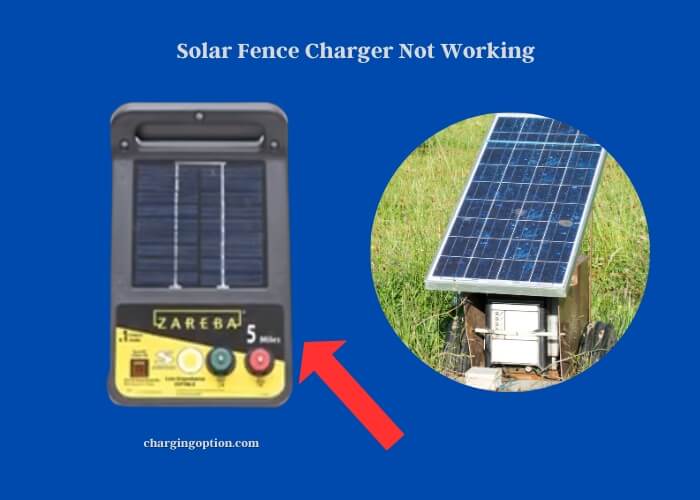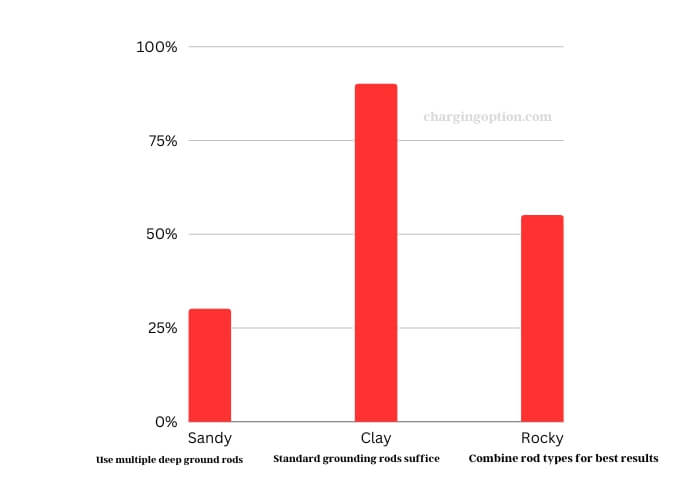Solar fence chargers can sometimes malfunction or not work as expected. Here’s a guide to help you identify some common issues and their solutions.
Solar fence chargers utilize the sun’s energy to power electric fences, ensuring that they provide a consistent charge to keep livestock or animals within a designated area. Yet, like any equipment, they can experience issues. For instance, if the electric fence is not working on dry ground, it could be due to poor conductivity in the soil. The earth plays a critical role in completing the electric circuit, so ensure that the fence’s grounding system is in proper condition.

If your electric fence is clicking but not working, it might indicate an issue with the connections or insulators. Regular checks can help catch loose wires or damaged components. Electric fence energizer problems might range from battery issues to faulty wiring. A weak electric charge could be due to several reasons including damaged wires, worn-out batteries, or insufficient solar charge. On the other hand, Gallagher electric fence troubleshooting can often provide insights into specific issues associated with that brand.
Testing the electric fence energizer is a crucial step. Using a fence tester can help you gauge the strength of the electric pulse. This tool is especially useful to determine if your electric fence is working without touching it directly. Bear in mind that wet conditions can also influence fence performance. If the fence stops working after rain, inspect for water damage or short circuits.
Regular maintenance and checks can help ensure that your solar fence charger remains functional, providing the necessary security for your property.
Solar Fence Charger Issues and Troubleshooting Solutions
Ever had a moment where you walked out and thought, “Why is my solar fence charger not working?” Well, you’re not alone. Solar fence chargers are fantastic, using the sun to keep our fences alive. But like everything else, they can hit a snag. Let’s walk through the maze of common issues and how to sidestep them.
The Basics of Solar Fence Chargers
What is a solar fence charger?
Imagine a device that absorbs sunlight, converting it into energy to keep your electric fence running. That’s a solar fence charger for you. It acts as the heart of an electric fence, pumping energy to keep those boundaries alive and kicking.
How it functions: The journey from sunlight to electric fence
Sunlight hits the solar panels, gets converted into electricity, and this juice is then stored in a battery. When your fence asks, “Hey, got some power for me?”, this charger delivers, ensuring your fence stays electrically active.
Dry Ground Dilemmas: Impact and Solutions
Role of soil in fence conductivity
Did you know that the soil beneath your feet plays a part in how well your fence works? Yep, it’s like a silent partner in crime. Good soil ensures the electric charge circulates well. Bad or dry soil? Not so much.
Potential fixes for fences on dry grounds
Ever tried making a call with a weak signal? Frustrating, right? That’s what your fence feels when the ground is too dry. Using deeper ground rods or opting for multiple rods can help. It’s like giving your fence a signal booster!

Comparison of Soil Types and Fence Conductivity
| Soil Type | Conductivity Rate | Best Grounding Techniques |
| Sandy | Low | Use multiple deep ground rods |
| Clay | High | Standard grounding rods suffice |
| Rocky | Medium | Combine rod types for best results |
Clicking Sounds: Causes and Countermeasures
Why you might hear a clicking noise
Hearing a rhythmic click from your fence? It’s trying to tell you something. Maybe there’s a short in the system or perhaps some vegetation is touching the fence. It’s like your fence’s way of sending an SOS!
Steps to rectify the problem
First, look for obvious signs – like a branch touching the fence. If that’s not the culprit, then inspect your insulators and connections. It’s akin to finding that one tangled earbud causing all the mess!
Energizer Concerns and Fixes
Overview of electric fence energizer problems
The energizer is like the brain of the operation. If it’s having a bad day, your fence will too. Common troubles include depleted batteries or faulty wiring.
Common signs of malfunction
Ever seen someone tired? They’re slow, right? Your energizer is the same. If it’s not supplying enough power or none at all, it might be signaling for some TLC.
Restoration tips
Keep an eye on the battery and replace if it’s too old. Also, routinely inspect the wiring. It’s like giving your charger a spa day!
Common Energizer Issues and Solutions
| Issue | Symptom | Recommended Fix |
| Battery depletion | Weak fence output | Replace or recharge the battery |
| Faulty wiring | Inconsistent power supply | Check and repair any damaged connections |
Brand-Specific Guidance: Gallagher Troubleshooting
Recognizing common problems specific to Gallagher chargers
Gallagher chargers are like the Ferraris of solar fence chargers. Still, even Ferraris need pit stops. Recognizing the tell-tale signs can save you a lot of headaches.
Actionable solutions for a smooth fence operation
Spotting an issue early with Gallagher chargers can be a game-changer. Be it a misaligned solar panel or a broken terminal, attending to it promptly can save the day. Think of it as catching a small leak before your boat sinks!
Common Gallagher Charger Issues
| Problem | Indicative Signs | Suggested Action |
| Misaligned solar panel | Charger not holding charge | Reorient the panel towards direct sunlight |
| Broken terminal | No output despite sunny conditions | Inspect and replace terminal if needed |
Evaluating Electric Fence Performance
Methods to test your fence energizer
Not sure if your fence is doing its job? Use a fence tester! This little gadget will give you the scoop on how your fence is performing. It’s like a fitness tracker, but for your fence.
Safe ways to assess fence functionality without direct contact
Worried about getting a shock? Use a blade of grass! Hold it against the fence, and if it tingles, your fence is live. Imagine it’s nature’s own version of a voltage tester.
Weather Woes: Rain-Related Fence Issues
How rain can affect fence operations
Rain is like that unexpected guest that might cause a ruckus. Water, especially if it pools, can cause short-circuits, weakening your fence’s power.
Precautionary measures and post-rain checks
After a heavy downpour, inspect for any puddles near your fence posts. Ensure that no waterlogged branches or leaves are touching the fence. Think of it as drying off after jumping into a pool. Your fence needs that TLC post-rain!
FAQs
Is My American Farmworks Electric Fence Not Working?
Yes, if your American Farmworks electric fence isn’t emitting a shock or is producing a weak one, it may have issues. It could be due to a range of reasons, including faulty wiring, poor grounding, or depleted batteries.
What Methods Can I Use to Test a Fence Charger?
To test a fence charger, use a fence tester. Simply insert the probe into the ground and touch the metal end to the fence. The lights or numbers on the tester will indicate the fence’s strength. If it shows no reading, your charger might be faulty.
What Could Be the Potential Issues with Goal Zero Solar Chargers?
When considering the goal of comparing anker 21w solar charger and goal Zero solar chargers, potential issues may arise. These could include varying charging speeds, compatibility with different devices, durability, and overall price point. It is important to thoroughly research and evaluate these factors to make an informed decision that aligns with your specific needs and requirements.
Why Is My Electric Fence So Weak?
A weak electric fence can result from several factors such as poor grounding, vegetation touching the fence causing shorts, or a malfunctioning charger. Regularly check for any obstructions and ensure the grounding system is efficient.
Are There Specific Troubleshooting Steps for Gallagher Solar Fence Chargers?
Yes, Gallagher solar fence chargers may require checking the orientation of the solar panels, ensuring they receive ample sunlight, inspecting for broken terminals, and checking the battery’s health.
Does a Weak Shock Mean My Electric Fence Isn’t Strong Enough?
Absolutely. A weak shock often indicates that the electric fence isn’t performing optimally. This could be due to issues with the grounding, shorts in the fence, or a malfunctioning charger.
What Causes Electric Fence Earthing Problems?
Electric fence earthing problems often arise from dry or sandy soil, which doesn’t conduct electricity well. Ensuring you have deep and multiple grounding rods can help improve conductivity.
How Can I Test a Hot Wire Fence?
To test a hot wire fence, you can use a fence tester or simply hold a blade of grass against the fence. If the grass tingles, the fence is live. But for an accurate reading on fence strength, always use a fence tester.
Summary: Ensuring your solar fence charger works flawlessly is like making sure your car runs smoothly. Both require a mix of routine checks, prompt problem-solving, and a bit of love. By being proactive and attentive to the little signs, you can make sure your fence stays charged and ready, come rain or shine! So, next time your fence throws a fit, you’ll know just what to do. Ready to be the superhero your fence needs?
